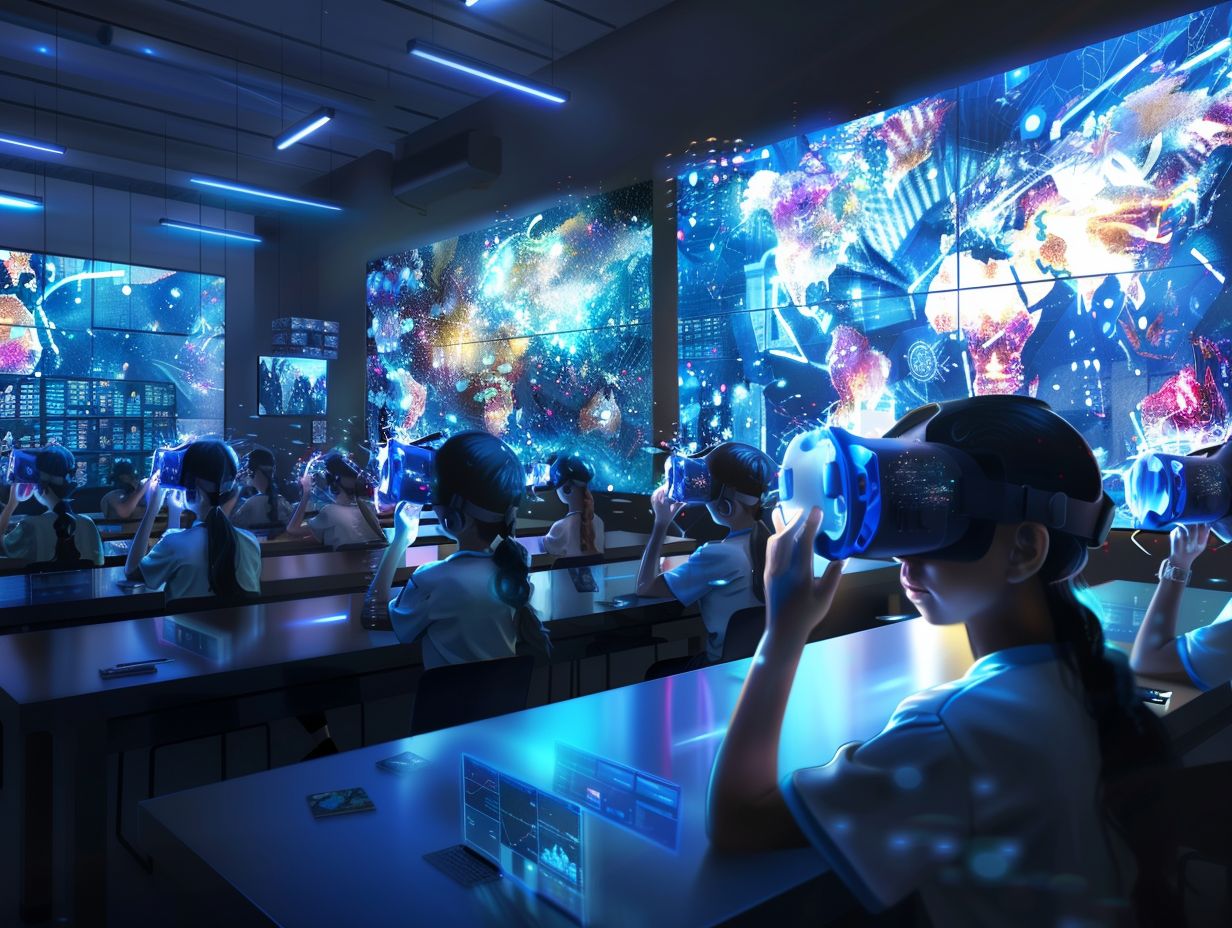The landscape of online tech education has transitioned from traditional classroom settings to online platforms. With the emergence of technologies such as Artificial Intelligence, Machine Learning, Virtual and Augmented Reality, and Gamification, the field of online education is undergoing rapid transformation. These technologies play a crucial role in enhancing the overall learning experience, increasing student engagement, and improving retention rates. Despite these benefits, challenges related to technological barriers and equity issues persist. Nevertheless, the future outlook for online tech education appears optimistic, with significant potential for ongoing growth and advancements.
Key Takeaways:

- Online tech education offers flexibility and accessibility, making it a convenient option for learners.
- Emerging technologies such as AI, VR, and gamification are enhancing the learning experience and improving student engagement and retention.
- The future of online tech education is promising, with potential for continued growth and advancements in technology. However, technological barriers and equity issues must be addressed for its full potential to be realized.
The Evolution of Online Tech Education
The Evolution of Online Tech Education has transformed the traditional classroom setting into a dynamic virtual environment, leveraging the power of technology to enhance learning experiences. This shift has revolutionized the way you interact with educational content, offering personalized learning paths and adaptive assessments. Emerging technological trends like Artificial Intelligence (AI) and Virtual Reality (VR) are playing a pivotal role in creating immersive learning environments that cater to various learning styles. AI-powered algorithms analyze student data to provide targeted recommendations, while VR simulations offer hands-on experiences in subjects like science and history. As technology continues to advance, the integration of AI and VR in education is set to redefine the future of learning.
From Traditional Classes to Online Platforms
The shift from traditional classes to online platforms has revolutionized the way you access educational content, providing you with a more flexible and interactive learning environment. By embracing blended learning techniques, you can now engage with a variety of multimedia resources, interactive quizzes, and live virtual classrooms. These online platforms offer flexibility in pacing and accessibility, allowing you to learn at your own speed and convenience. Teachers benefit from accessing a wider range of teaching tools and resources, enabling them to create more immersive learning experiences for you. The shift to online platforms has truly transformed education into a more dynamic and personalized journey for both students and teachers alike.
Benefits of Online Tech Education
Online Tech Education provides numerous benefits, offering improved flexibility and accessibility for both students and teachers, leading to a more customized learning experience. Through the use of virtual reality technology, online tech education can develop immersive learning environments that accommodate various learning styles, boosting student involvement. The interactive simulations in virtual reality enable students to put theoretical knowledge into practice, promoting a better comprehension of intricate concepts. Adaptive learning algorithms integrated into online tech education platforms can tailor the learning path for each student, offering specific assistance and challenges based on their individual advancement, ultimately leading to a more productive and efficient learning process overall.
Flexibility and Accessibility
One of the key benefits of online tech education is the flexibility it offers, allowing you to learn at your own pace and access educational resources from anywhere, fostering a personalized learning journey. This flexibility in online tech education give the power tos you to balance your academic pursuits with work, family commitments, and other responsibilities, making education more accessible to a diverse range of individuals. The integration of emerging technologies like Augmented Reality (AR) enhances your learning experience by providing interactive simulations and real-world applications, immersing you in a dynamic and engaging educational environment. As technology continues to evolve, online tech education remains at the forefront, adapting and innovating to meet your learning needs in a digital age.
Cost-Effectiveness
Utilizing online tech education offers a cost-effective solution, eliminating the necessity for physical resources and decreasing overall expenses for educational institutions. This approach makes high-quality education more accessible to a broader student demographic. The integration of AI technology and educational tools presents a scalable solution for educational institutions to expand their reach to more students without incurring significant additional costs. By harnessing AI algorithms and educational platforms, institutions can automate specific processes, customize learning experiences, and efficiently monitor student progress. This scalability leads to a more financially sustainable education system, as resources are utilized more effectively, benefiting both the institutions and the students. Additionally, online tech education obviates the need for physical classrooms, further reducing overhead costs and enhancing the affordability of education for both learners and providers.
Emerging Technologies in Online Tech Education
 The landscape of Online Tech Education is experiencing rapid changes due to the integration of advanced technologies such as Artificial Intelligence, Virtual Reality, and Augmented Reality. These cutting-edge technologies are enhancing the learning process by introducing immersive and interactive elements. These emerging technologies are transforming the traditional methods of online education by offering personalized learning experiences, immediate feedback, and adaptive content distribution. AI algorithms have the capability to analyze students’ performance data to customize their learning paths, while VR technology provides simulated environments for hands-on training. Further, gamification techniques, like leaderboards and rewards systems driven by AI, are effective in encouraging active student engagement with the course material. Through the adoption of these innovative tools, online education is becoming more interactive, engaging, and efficient, catering to a wide range of learning preferences and promoting continuous skill enhancement.
The landscape of Online Tech Education is experiencing rapid changes due to the integration of advanced technologies such as Artificial Intelligence, Virtual Reality, and Augmented Reality. These cutting-edge technologies are enhancing the learning process by introducing immersive and interactive elements. These emerging technologies are transforming the traditional methods of online education by offering personalized learning experiences, immediate feedback, and adaptive content distribution. AI algorithms have the capability to analyze students’ performance data to customize their learning paths, while VR technology provides simulated environments for hands-on training. Further, gamification techniques, like leaderboards and rewards systems driven by AI, are effective in encouraging active student engagement with the course material. Through the adoption of these innovative tools, online education is becoming more interactive, engaging, and efficient, catering to a wide range of learning preferences and promoting continuous skill enhancement.
Artificial Intelligence and Machine Learning
Artificial Intelligence and Machine Learning are transforming online tech education by offering personalized and adaptive learning experiences to students, resulting in improved knowledge retention and the development of dynamic generative AI applications. Through AI algorithms, you receive customized learning paths that align with your unique learning styles, pace, and preferences. This tailored approach allows you to advance at your own rate, ensuring a thorough understanding of concepts before moving on. Machine learning plays a critical role in producing interactive and captivating content that boosts student engagement and comprehension. By analyzing user data, AI can anticipate areas where you might encounter difficulties and provide targeted assistance, promoting a more effective and streamlined learning process.
Virtual and Augmented Reality
Virtual and Augmented Reality technologies are reshaping online tech education by providing immersive experiences that transport you into interactive learning environments, fostering deeper engagement and understanding. Through the use of VR headsets like Oculus Rift or HTC Vive, you can explore virtual worlds and manipulate objects in ways that were previously impossible in traditional online learning formats. This level of interactivity not only captures your attention but also helps you retain information better. AR tools such as Microsoft HoloLens can overlay digital information onto the physical world, allowing for hands-on learning experiences that blend the virtual and real. This blended learning approach not only makes learning more dynamic and engaging but also helps you develop critical thinking skills and problem-solving abilities.
Gamification
Gamification strategies are transforming online tech education by incorporating interactive and game-like elements into learning modules, boosting student motivation, and promoting active participation in the educational process. This cutting-edge approach utilizes the inherent human drive for competition and rewards, fostering a more dynamic and immersive learning environment. Through the integration of gamified quizzes, leaderboards, and progress tracking features, educators can effectively address diverse learning styles and preferences, leading to enhanced knowledge retention and increased student satisfaction levels. The integration of advanced technologies like virtual reality and artificial intelligence further enriches the gamified learning experience, offering students a modern educational journey that is both engaging and impactful.
Impact of Emerging Technologies on Online Tech Education
The integration of emerging technologies in online tech education has resulted in an enhanced learning experience, fostering improved student engagement and retention through personalized and interactive educational content. These advancements, such as Artificial Intelligence (AI) and Virtual Reality (VR), have revolutionized how educators deliver content and interact with students. AI algorithms analyze student performance data to offer personalized learning paths, catering to individual needs and pacing. In parallel, VR simulations provide immersive learning experiences, allowing students to explore complex concepts in a virtual environment. This combination enhances student understanding, making learning more engaging and memorable. With these innovative tools, online education becomes increasingly adaptive and student-centric, ultimately leading to more effective learning outcomes.
Enhanced Learning Experience
Emerging technologies have transformed your online learning experience by providing you with interactive and engaging content that caters to your diverse learning styles, resulting in a more dynamic and immersive educational journey. These technologies offer you personalized learning pathways that adapt to your strengths and areas needing improvement. By tailoring the content delivery based on your progress and preferences, technology creates a customized learning experience. Interactive elements such as gamified quizzes, virtual simulations, and collaborative online projects not only make learning fun but also boost your engagement and retention. This blend of personalization and interactivity enhances your comprehension, critical thinking, and problem-solving skills, ultimately leading to improved academic performance and holistic student outcomes.
Improved Student Engagement and Retention
 The implementation of emerging technologies has significantly enhanced student engagement and knowledge retention in online tech education, providing personalized and adaptive learning experiences that cater to individual student needs. Technologies like AI and VR have revolutionized the learning landscape by offering interactive simulations and personalized feedback that align with students’ diverse learning preferences. AI-powered systems have the capability to analyze individual learning patterns and adjust content delivery accordingly, enabling a more customized and efficient learning journey. Virtual reality experiences provide immersive opportunities that help students better understand complex concepts in a more engaging manner. By incorporating adaptive learning strategies, educators can effectively address the varying needs of each student, leading to a more efficient and rewarding educational experience.
The implementation of emerging technologies has significantly enhanced student engagement and knowledge retention in online tech education, providing personalized and adaptive learning experiences that cater to individual student needs. Technologies like AI and VR have revolutionized the learning landscape by offering interactive simulations and personalized feedback that align with students’ diverse learning preferences. AI-powered systems have the capability to analyze individual learning patterns and adjust content delivery accordingly, enabling a more customized and efficient learning journey. Virtual reality experiences provide immersive opportunities that help students better understand complex concepts in a more engaging manner. By incorporating adaptive learning strategies, educators can effectively address the varying needs of each student, leading to a more efficient and rewarding educational experience.
Challenges and Limitations
Despite the numerous benefits, online tech education faces challenges such as technological barriers and concerns regarding data security, impacting equity and access to quality education for all students. It is crucial for educators and policymakers to address these challenges in order to ensure that all students have equal opportunities to access online educational resources. Technological limitations, such as lack of high-speed internet in rural areas or outdated devices, can hinder students from fully engaging in online learning. Data security concerns, including safeguarding personal information and protecting against cyber threats, pose significant risks that must be carefully managed. By overcoming these barriers, the education sector can work towards providing a more inclusive and accessible learning environment for all.
Technological Barriers
Technological barriers present a notable challenge in online tech education, as issues concerning compatibility, infrastructure, and the adoption of emerging technologies such as blockchain can impede the smooth implementation and accessibility of educational resources. These challenges hinder the seamless delivery of educational content and interaction between students and instructors. It is essential to ensure that online platforms can function effectively across different devices and internet connections to establish an inclusive learning environment. The incorporation of blockchain technology has the potential to improve security and transparency in online assessments and certifications. To overcome these obstacles, there is a need for continuous innovation and investment in enhancing digital infrastructure to support the dynamic landscape of online education.
Equity and Access Issues
Equity and access issues pose a significant challenge in online tech education, as discrepancies in technology access and digital literacy can hinder the widespread integration of emerging technologies by all students. These discrepancies create obstacles that restrict the full potential of online learning platforms, reducing the opportunities for students from disadvantaged backgrounds to interact with cutting-edge technological advancements. Closing this digital gap is essential to ensuring that all learners have equitable access to educational resources and can cultivate the necessary skills to excel in a tech-centric society. Addressing these issues necessitates a comprehensive approach that incorporates initiatives focused on enhancing broadband infrastructure, supplying affordable devices, and delivering digital skills training programs.”
The Future of Online Tech Education
The future of Online Tech Education holds immense potential for continued growth and advancements, driven by the integration of innovative technologies and the evolution of personalized learning experiences for students. These advancements in technology integration are paving the way for a more interactive and engaging learning environment, where you can tailor your educational journey based on your individual needs and preferences. With the rise of AI and machine learning, online tech education platforms are becoming increasingly adept at providing personalized recommendations and adaptive assessments to enhance your overall educational outcomes. This personalized and adaptive approach not only fosters a deeper understanding of complex tech concepts but also helps you develop crucial problem-solving and critical thinking skills essential for success in the digital age.
Potential for Continued Growth and Advancements
Online tech education is positioned for continued growth and advancements, offering a strong potential to revolutionize the traditional educational landscape by embracing emerging technologies and fostering innovative learning practices for students. As technology continues to evolve, online education platforms are exploring new avenues to enhance personalized learning experiences. The incorporation of artificial intelligence, virtual reality, and machine learning into online educational tools presents numerous opportunities to create customized learning paths for students, catering to their individual needs and preferences. These advancements not only enhance the engagement and interactivity of learning but also give the power to educators to monitor students’ progress more effectively, offering timely feedback and support. With the ongoing progress in online education, the future holds significant promise for reshaping the way knowledge is imparted and acquired.
Frequently Asked Questions

What are emerging technologies in online tech education?
Emerging technologies in online tech education refer to new and innovative tools, platforms, and methods that are being used to enhance the learning experience for students in the field of technology.
How are emerging technologies being incorporated into online tech education?
Emerging technologies are being incorporated into online tech education through the use of virtual and augmented reality, artificial intelligence, gamification, and interactive learning platforms.
What are the benefits of using emerging technologies in online tech education?
The benefits of using emerging technologies in online tech education include increased engagement and motivation for students, personalized learning experiences, and preparation for the constantly evolving technology industry.
Are there any challenges in implementing emerging technologies in online tech education?
Yes, some challenges may include the high cost of implementing these technologies, the need for specialized training for educators, and ensuring access and equity for all students.
How do emerging technologies in online tech education impact the future of education?
Emerging technologies in online tech education have the potential to transform the way students learn and prepare for careers in the technology industry, leading to a more dynamic and relevant education experience.
Are there any ethical considerations when using emerging technologies in online tech education?
Yes, ethical considerations may include data privacy and security, the potential for bias in algorithms used in artificial intelligence, and the responsibility of educators to ensure the responsible and ethical use of these technologies.
